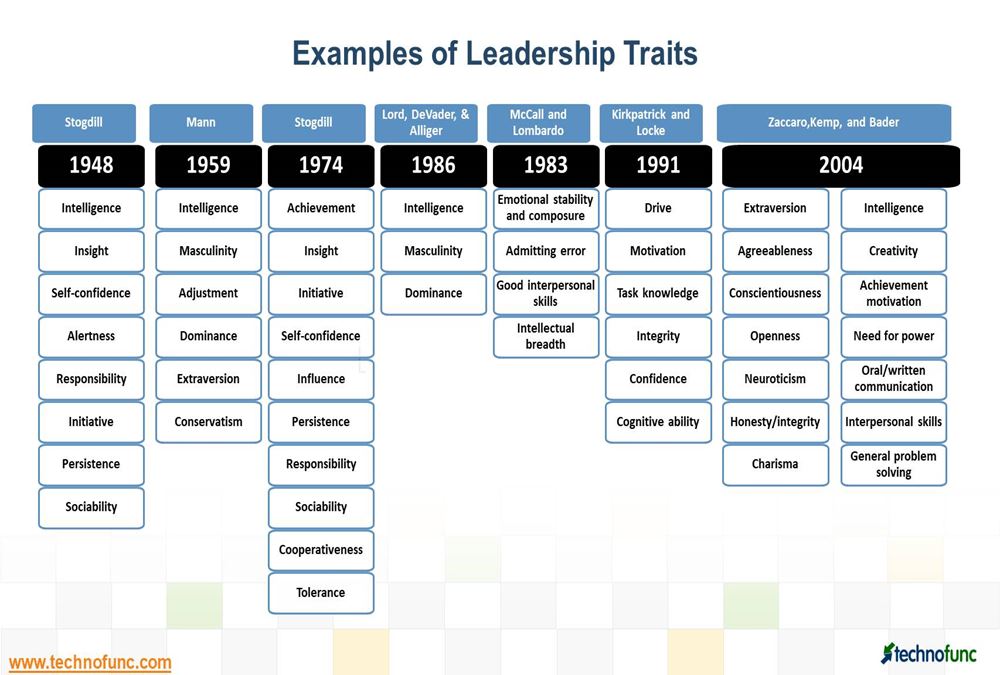- Home
- Business Processes
- Industry Knowledge
- Aerospace Industry
- Automotive Industry
- Banking Domain
- BFSI Industry
- Consumer/ FMCG Industry
- Chemicals Industry
- Engineering & Construction
- Energy Industry
- Education Domain
- Finance Domain
- Hospitality Domain
- Healthcare Industry
- Insurance Domain
- Retail Industry
- Travel and Tourism Domain
- Telecom Industry
- Leadership Skills
- eLearning
- Home
- Leadership
- Leadership Theories
- Leadership Traits – A great List
Leadership Traits – A great List
What are the qualities and characteristics of a good leader? Great leaders possess core leadership traits and skills. The list includes the most important leadership qualities and skills to look for in a great leader. These are must-have traits of a powerful and successful leader, the qualities a leader possess to be great.
A broad classification to six categories of traits is also done below:
Physical Characteristics of the Leader:
- Age
- Height
- Weight
- Alertness
- Energetic
- Masculinity
- High energy level
- Physical stamina
- Tolerance for stress
- Not concerned about being overworked
- Vitality
Background Characteristics of the Leader:
- Education
- Social Status
- Mobility
- Experience
- Experience in a variety of different types of situations
- Broader perspective
- Expertise in dealing with different types of problems
- Competent and skilled
Intelligence Characteristics of the Leader:
- Ability
- Judgment
- Knowledge
- Clever (intelligent)
- Conceptually skilled
- Creative
- Knowledgeable about group task
- Intellectual breadth
- Insight
- Learns from experience
- Adapts to change
- Good judgment
- Foresight
- Intuition
- Creativity
- Self-knowledge
- Coordinator
- Objective
- Decisive
- Asks for more responsibility
- Knows how to delegate
Personality/Emotional Characteristics of the Leader:
- Aggressiveness
- Alertness
- Dominance
- Decisiveness
- Enthusiasm
- Extroversion
- Independence
- Self-confidence
- Authoritarianism
- Assertive
- Tolerant of stress
- Conservatism
- Desire to improve
- Understands own strengths and weaknesses
- Self-objectivity
- Emotional intelligence
- Self-awareness
- Empathy
- Self-regulation
- Ambitious
- Courageous
- Knows self
- Risk taker
- Not intimidated by superiors
- Personal competence
- Optimistic
- Exhibits concern for others
- Encourages and engages opposing viewpoints
- Constant and reliable
- Self-disciplined
- Determination
- Need to achieve
- Caring
- Empathizing
- Constancy
Task-Oriented Characteristics of the Leader:
- Achievement Needs
- Responsibility
- Initiative
- Persistence
- Ambitiousness
- Achievement-orientated
- Decisive
- Persistent
- Willingness to assume responsibility
- Organized (administrative ability)
Social Characteristics of the Leader:
- Sociability
- Supervisory Ability
- Cooperativeness
- Popularity
- Prestige
- Tact
- Diplomacy
- Adaptability
- Adjustment
- Cooperative
- Dependable
- Tactful
- Persuasive
- Socially skilled
- Emotional stability and composure
- Good interpersonal skills
- Well-adjusted
- Oriented toward improving self
- Detached
- Honest
- Ethical
- Trustworthy
- Behavioral flexibility
- Understanding
- Empathy
- Social Insight
- Charm
- Tact
- Diplomacy
- Persuasiveness
- Listener
- Collaborative
- Strong motivator
- Cooperative
- Influencer
Communication:
- Ability to communicate
- Ability to articulate a vision
- Ability to persuade others
- Communicate purpose
- Communicate direction
- Communicates passion to others
- Good communication skills
- Use metaphors
- Experts at one-to-one communication
- Superior speakers
- Excellent writing skills
- Creates and maintains a communications network
- Has people keep them informed on problem situations
- Networks with people inside the organization
- Maintains contacts outside the organization
- Doesn’t depend on only one source for information
- Able to communicate with key individuals
- Eager to explore new approaches to their work
- Are not fuzzy about results, interested in ways to track their progress
- Communicates persuasively

Related Links
You May Also Like
-
The great man theory of leadership is a 19th-century idea that states a person is either a natural-born leader or not. Some people are born with the necessary leadership attributes that help them create a great impact on society, politics, or the military. The theory focuses on identifying the innate qualities and characteristics possessed by great men.
-
Behavioral Theories of Leadership
Behavioral Theory of leadership is a big leap from Trait Theory, as it was developed scientifically by conducting behaviour focused studies. The theory emphasizes that leadership capability can be learned, rather than being inherent. This theory is based on the principle that a leader's behaviors can be conditioned in a manner that one can have a specific response to specific stimuli.
-
Continuum of leadership is a leadership theory based on the relationship between the level of freedom given to the team and the level of authority used by the manager. The chosen leadership style will depend on multiple factors, including the leader's personality.
-
Participative Leadership Theories
Participative leadership theories rely on the involvement of different participants and suggest that the ideal leadership style is one that takes the inputs of others into account. Participative leaders encourage participation and contributions from group members and involve them in the decision-making process. Participative leadership tries to achieve through people, teamwork and collaboration.
-
Self-Fulfilling Prophecy (SFP) Leader Theory
Pygmalion theory of Leadership is a model of SFP at work involving supervisory expectancy based on the pygmalion effect. This effect is a type of self-fulfilling prophecy (SFP) in which raising leader's expectations regarding subordinate performance boosts the group's performance. Managers who are led to demand more from their team, lead the team to better performance. There is some evidence that the SFP effect does exists.
-
The four theory of leadership was formulated after studying hundreds of leaders and the model includes four basic dimensions of effective leadership - support; interaction; facilitation; goal emphasis, and work facilitation. This model was tested as a predictor of an organization's effectiveness.
-
According to Environmental theories of leadership, a leader needs to deal effectively with environmental complexities and lead in a certain style as a result of environmental responses. Environmental influenced leadership demand leaders to learn how to adjust environmental factors. Leaders also have the responsibility of creating the right kind of environment for their followers by focusing on environmental factors and pressures.
-
Communication has as its central objective the transmission of meaning. The process of communication is successful only when the receiver understands an idea as the sender intended it. How does a message or an idea travel from one person to another? To transmit our message, we engage in a sensitive and complex process of communication, with different elements like sender, message, channels, receiver, noise, and feedback.
-
Certain generally accepted truths or principles of communication are important to consider when communicating with others. These principles hold true for all people in every culture. By understanding these principles, you will experience greater communication effectiveness. An effective communication system is one that achieved its objectives. Communication is effective where there are no barriers to communication.
-
McClelland's Theory of Needs is a human motivation theory which states that an individual's specific needs are acquired over time through our culture and life experiences. As per the three needs theory, these acquired needs significantly influence the behavior of an individual. The three main driving motivators are the needs for achievement, affiliation, and power.
Explore Our Free Training Articles or
Sign Up to Start With Our eLearning Courses

About Us
Learning
© 2023 TechnoFunc, All Rights Reserved










